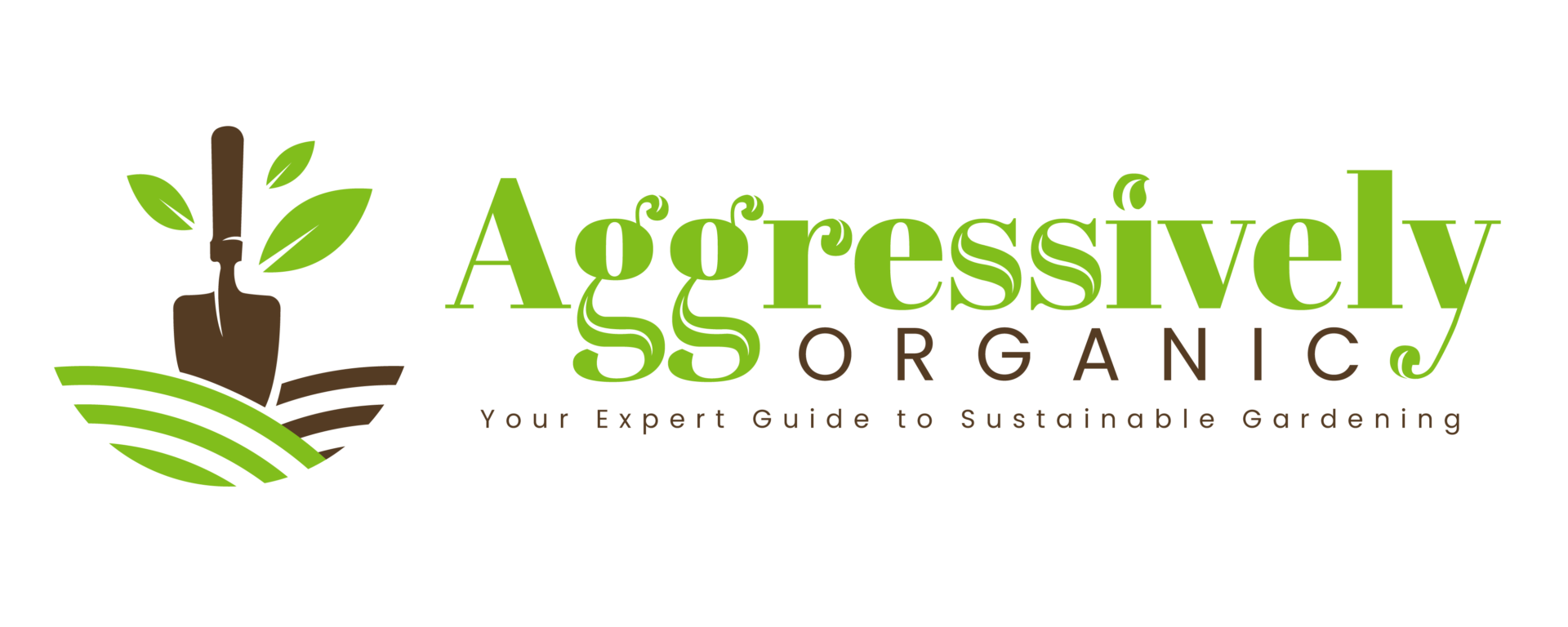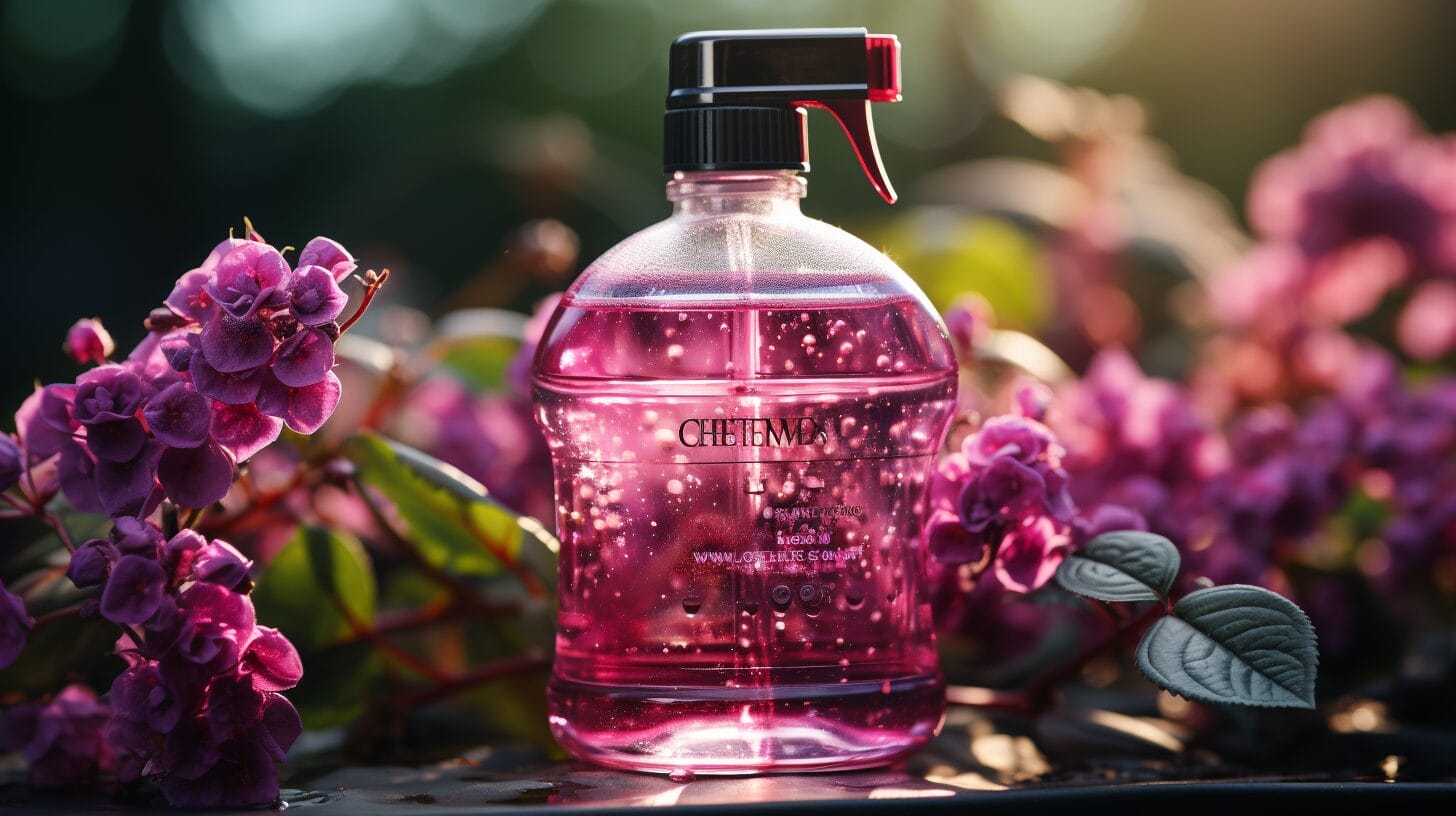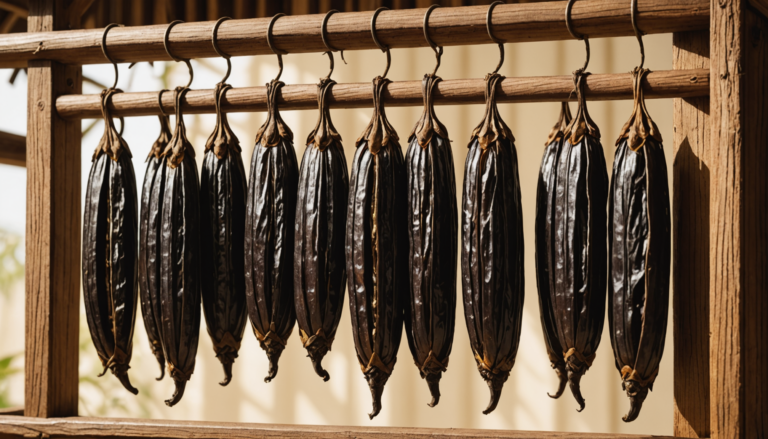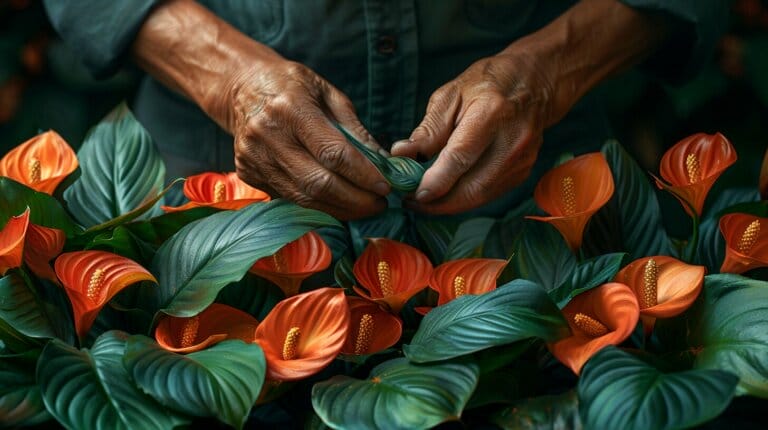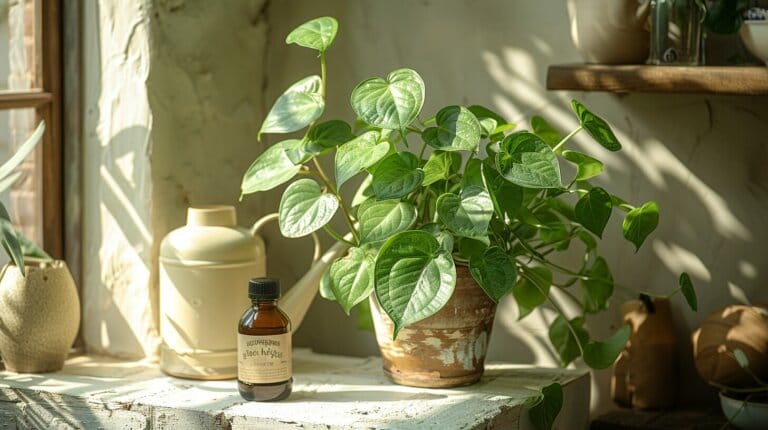As we reveled in the radiant beauty of our thriving rose garden, we spotted undeniable indications of an aphid invasion. These minuscule insects can drain the energy from our much-loved roses. As a result, we persistently pursue efficient and non-harsh methods to combat them.
We’ve come across numerous recommendations to use vinegar as an eco-friendly pesticide, but we’re mindful of the potential risks to our plants. In our quest for a safe and effective remedy, we’ve gathered insights and conducted experiments to see if vinegar truly is the ally we need in our gardens.
As we unpack the results and share our findings, we invite you to consider the implications for your floral haven. Will vinegar emerge as a hero in the fight against aphids, or is it a double-edged sword that might harm your roses?
Key Takeaways
- Vinegar’s efficacy on plants comes from its acetic acid content, which can kill or inhibit certain pests and weeds.
- Diluting vinegar with water and adding a surfactant like castile soap helps create a balanced solution.
- Vinegar can be effective in deterring aphids on rose bushes, but high concentrations can harm the bushes and cause leaf burns or discoloration.
- Precise application and testing the vinegar solution on a small area before full application are recommended to avoid harming rose bushes.
Understanding the Power of Vinegar on Plants
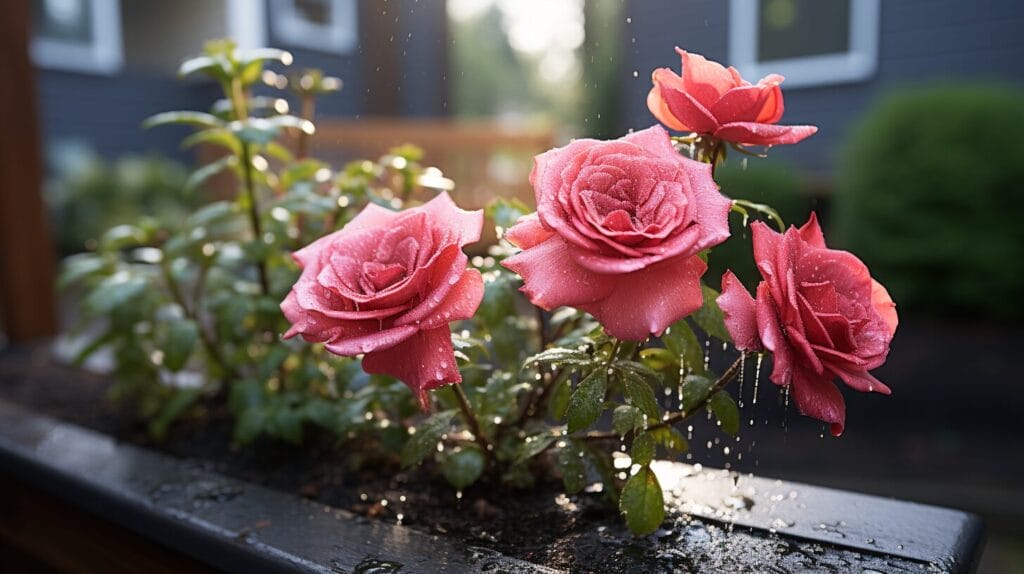
Vinegar’s efficacy on plants stems from its acetic acid content, which can effectively kill or inhibit the growth of certain pests and weeds. This potent ingredient is what gives vinegar its ability to manage unwanted vegetation and pest populations like aphids in gardens.
When we create a vinegar solution to target pests, we’re relying on this acetic acid to do the heavy lifting. However, it’s crucial to understand that while acetic acid can kill plant pests, it’s not selective and can damage or kill the plants we want to keep if we’re not careful.
That’s why we must dilute the vinegar appropriately. Our goal is to find that sweet spot where the solution is strong enough to affect the pests but not so strong that it harms our cherished roses or other plants.
To achieve this balance:
- We often mix vinegar with water
- We add a surfactant like castile soap to help the solution cling to the leaves and pests.
- Remember, using vinegar in our gardens is a method we recommend as a last resort, especially in organic gardening where we aim to maintain a natural balance.
- When applying the vinegar solution, we must be mindful of the surrounding plants and soil. Acetic acid can alter soil pH and affect its overall health, so targeted application is key.
Exploring the Impact of Vinegar on Rose Bushes
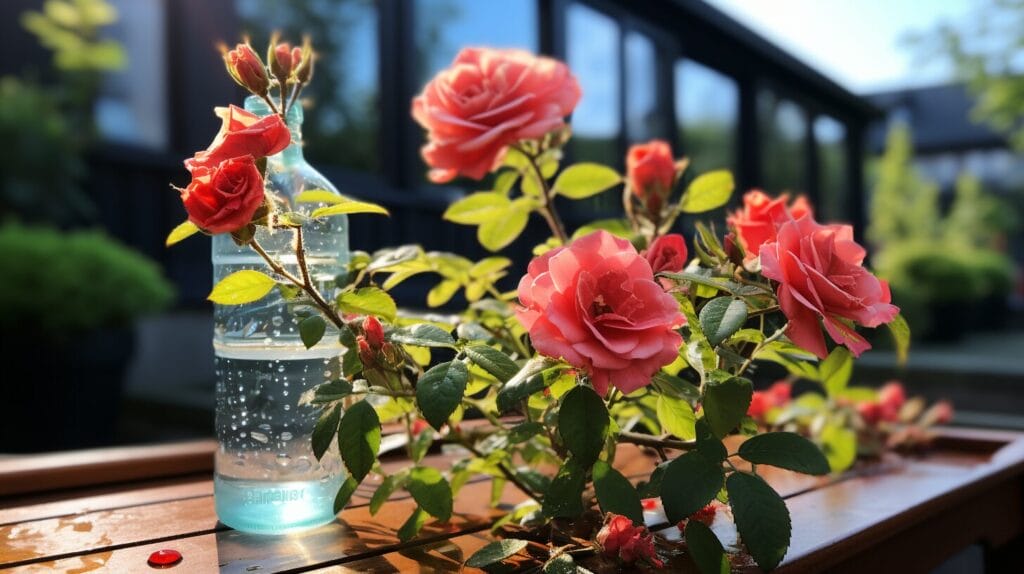
When considering the use of vinegar on rose bushes, it’s crucial to weigh the potential benefits against the risks of damage or even plant death. Vinegar’s acidic nature can be a double-edged sword—while it may assist in aphid control, it could also potentially harm the rose plant if not used with caution.
Vinegar can lower the pH of the soil, which might not be ideal for rose bushes that prefer a neutral to slightly acidic soil. Here’s a clear comparison for us to consider:
| Impact on Rose Bushes | Consideration |
|---|---|
| Aphid Control | Vinegar solutions can deter aphids when applied correctly. |
| Soil pH Disruption | High concentrations can acidify the soil, potentially harming the rose plant. |
| Foliar Damage | Direct contact with foliage may cause leaf burns or discoloration. |
| Plant Stress | Overuse can stress plants, making them more susceptible to disease. |
| Environmental Concerns | Non-targeted plants and beneficial insects could be affected by overspray. |
We need to ensure that any treatment we consider, including vinegar, is safe and effective for our roses. While vinegar may help in controlling aphids, it should never be the first line of defense. Instead, it’s better to start with gentler methods, such as water sprays or introducing beneficial predators.
If we do opt for vinegar, it’s crucial to dilute it properly and apply it with care, avoiding the leaves and focusing on the pests.
Effective Use of Vinegar in the Battle Against Pests and Weeds
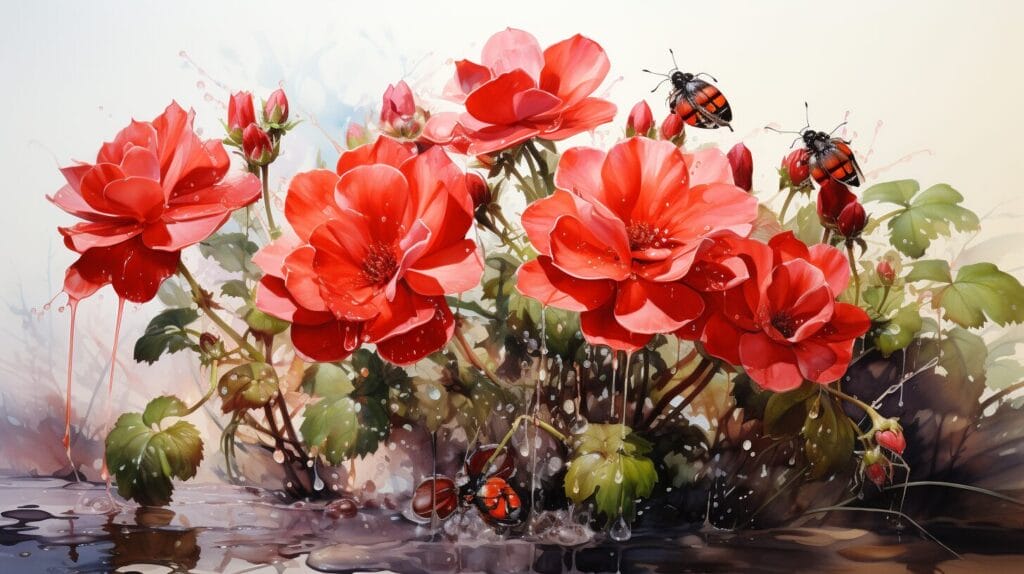
Acknowledging the delicate balance between aphid control and plant health, it’s also worth exploring how a properly diluted vinegar solution can serve as an ally against both pests and invasive weeds.
We’ve discovered that combining household vinegar with a splash of dish soap creates a potent mixture that can effectively combat aphids on rose bushes. This natural pest control approach is gentle on plants but tough on pests. Additionally, this vinegar and dish soap solution has also been found to be effective in controlling jade plant scales. By simply spraying the affected plants with this mixture, the scales can be effectively eliminated without causing harm to the jade plants themselves. This natural pest control method provides an eco-friendly and cost-effective way to protect your plants from these common pests.
Vinegar’s acidic nature makes it a formidable weed killer as well, particularly against stubborn multiflora roses that can often invade spaces where they’re not wanted. However, it’s crucial to use vinegar judiciously; since it’s non-selective, it can harm your rose bushes if not applied with precision.
To safeguard our cherished rose bushes while declaring war on unwanted insects and weeds, we’ve come up with a recipe that strikes the right balance:
- Mix vinegar with water and a few drops of castile soap to enhance its sticking power on aphid bodies
- Test this solution on a small area first to ensure it doesn’t harm the plant.
When it comes to application, we’re mindful of the weather. The best time to apply our vinegar-based spray is during a calm, dry day to prevent it from affecting other plants and to maximize its effectiveness on the aphids and weeds we’re targeting.
Frequently Asked Questions About Applying Vinegar Solutions
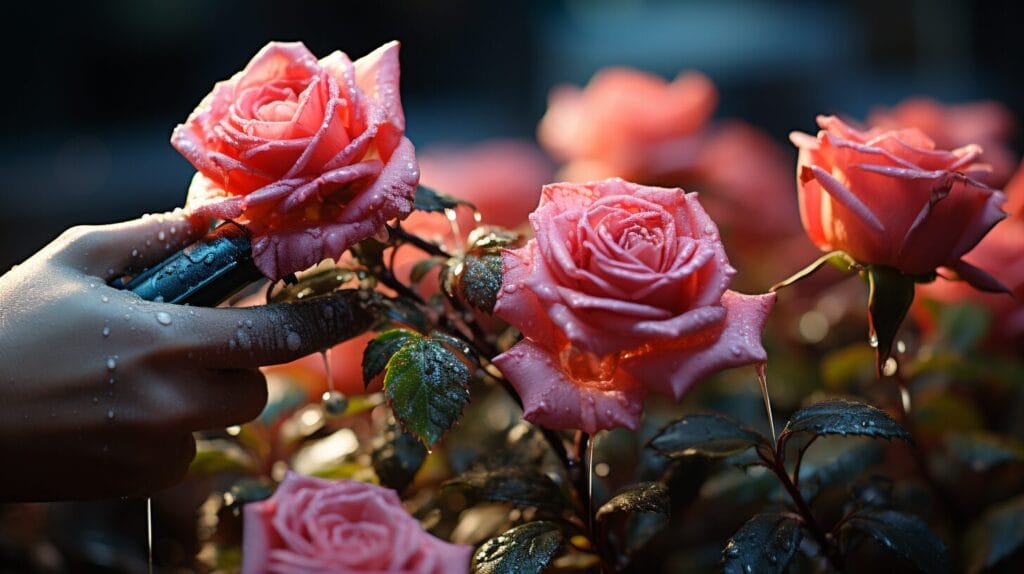
To ensure the safety and effectiveness of vinegar solutions on roses, many gardeners frequently ask about the appropriate concentration and timing for application. We’ve gathered the most common queries to help you confidently use vinegar to combat those pesky aphids without harming your beloved rose bushes.
When dealing with a rose aphid infestation, it’s crucial to strike a balance. Vinegar can indeed kill aphids on roses, but it must be correctly diluted to avoid damaging the plants. A natural aphid solution, like diluted vinegar, offers a safer alternative to chemical pesticides, but it’s important to get the mix just right.
Here are some vivid details to remember when applying vinegar solutions:
- The Golden Ratio: A gentle 1:3 mixture of vinegar to water, settling on the leaves just enough to deter aphids.
- Morning Dew: The early morning light is the best time to spray, when the sun won’t magnify the vinegar and burn the leaves.
- Season’s Greetings: A pleasant spring day is the ideal season for treatment when aphids are most active and roses are in vigorous growth.
- Leafy Caress: Spot-test a few leaves to ensure the diluted vinegar isn’t too strong, safeguarding the health of the entire plant.
Can Vinegar be Used as a Weed Killer in Gardens?
Yes, vinegar can be used as a natural weed killer in gardens. Its acetic acid content helps stop weeds from invading flower beds and vegetable patches. However, be cautious when applying as it can also harm desirable plants. Dilute with water and spray directly on weeds to avoid damaging the surrounding vegetation.
Alternatives to Vinegar for Rose Bush Health and Longevity
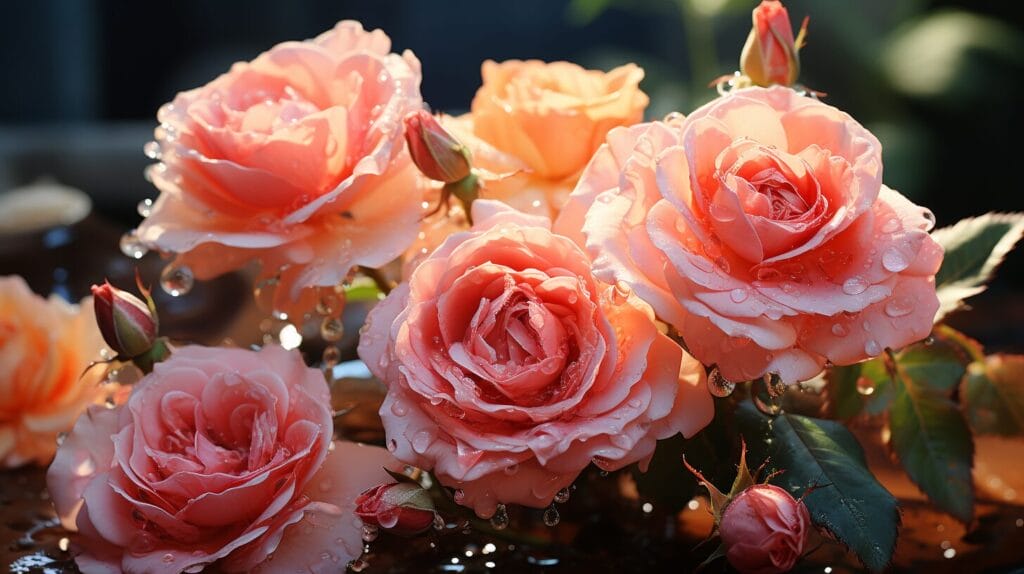
Beyond vinegar, there are diverse approaches to maintaining the health and longevity of rose bushes that effectively deter aphids and promote thriving gardens. For aphid control, introducing beneficial insects such as ladybugs or lacewings into your rose garden can be a game-changer.
Additionally, a strong stream of water from the garden hose can dislodge aphids from rose bushes. We also encourage gardeners to keep their plants healthy, as robust rose bushes are less vulnerable to pest infestations.
Instead of reaching for a traditional herbicide, consider using neem oil, a natural product that works against a wide range of pests while being safe for the environment.
We also advocate for the use of soap sprays, which can be made with ingredients such as castile soap and water. These sprays can suffocate aphids without damaging the plant when used appropriately.
Conclusion
In conclusion, vinegar, when used correctly, can be a gardener’s ally against aphids without harming rose bushes. Dilution is key to balancing effectiveness with safety. It’s a simple, eco-friendly method that, along with alternatives, can ensure the thriving health and longevity of our roses.
So, let’s embrace this natural solution, safeguard our blooms, and continue to enjoy the vibrancy and fragrance they bring to our gardens.
Frequently Asked Questions
Can vinegar kill aphids on rose bushes?
Yes, vinegar can kill aphids on roses. You can use a spray bottle to mix part vinegar to 3 parts water and spray it onto the aphids. White vinegar or apple cider vinegar are both effective for this purpose.
Is using vinegar as a herbicide kill a rose bush?
Vinegar is a potent weed killer due to its high acetic acid content, and if used undiluted or in large quantities it can kill a rose bush. However, if applied correctly and carefully, it can assist in aphid control without harming your rose plants.
How much vinegar should I use to get rid of aphids on roses?
For effective control of aphids on roses without damaging the plant, you may use a mixture of approximately one part vinegar to three parts water. Using too much vinegar can kill the rose plant, as vinegar contains acetic acid which is enough to kill garden plants when used undiluted.
Can vinegar kill the rose buds?
Vinegar is an effective weed killer and aphid control solution. However, if applied in too high a concentration or directly onto rose buds, it may cause damage and potentially kill the buds. Always use a diluted vinegar solution and aim to spray on the aphids, not the buds directly.
Will vinegar kill rose bushes and other established multiflora rose plants?
Vinegar, especially in high concentrations or undiluted, can harm or kill established multiflora rose plants. Therefore, you should take care not to overuse vinegar or spray it directly on desired plants. Vinegar’s main use around roses should be as an aphid control method, not as a plant killer.
